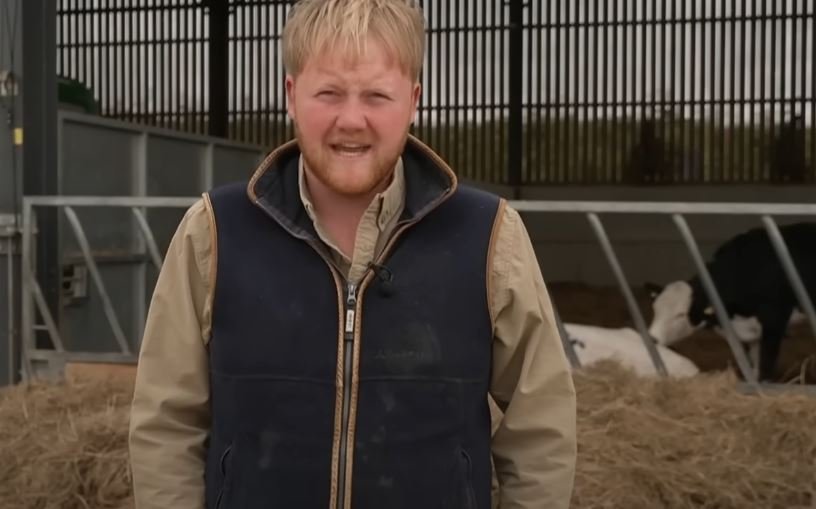
Kaleb Cooper’s ascent at the age of 26 has significantly changed how the public views young farmers. Cooper, who was first introduced as Jeremy Clarkson’s straightforward mentor on Clarkson’s Farm, enthralled audiences with his humor, sincerity, and unwavering work ethic. He has expanded his profile by using that authenticity to become a speaker, author, and TV regular in addition to a farmer. Considering that he only paid himself 50p per hour for farm work a few years ago, his financial rise has been especially remarkable.
His net worth has increased significantly over the last three years, eerily resembling that of niche television personalities who have converted modest publicity into steady sources of income. Kaleb Cooper Productions Ltd. held £908,860 in equity, according to Companies House filings in 2024, while his contracting firm reported assets that doubled from £52,000 to £96,000. An additional £46,000 was added by his holding company, bringing his total value dangerously close to £1 million.
| Name | Kaleb Cooper |
|---|---|
| Birthdate | July 2, 1998 |
| Birthplace | Chipping Norton, Oxfordshire, England |
| Age | 27 (as of 2025) |
| Occupation | Farmer, TV Personality, Author, Speaker |
| Known For | Clarkson’s Farm (Amazon Prime Video) |
| Estimated Net Worth (2025) | £1 million ($1.28 million USD) |
| Companies Owned | Kaleb Cooper Productions Ltd, Kaleb Cooper Contracting Ltd, Kaleb Cooper Holdings Ltd |
| Notable Works | “The World According to Kaleb”, “It’s a Farming Thing” |
| Family | Fiancée: Taya; Children: Oscar, Willa, Baby on the way |
Kaleb has significantly increased his market presence by fusing relatability with sound financial judgment. His books, especially “The World According to Kaleb” and “It’s a Farming Thing,” were in high demand from both readers enthralled with his rural viewpoint and fans of the show. Over the past few months, his countrywide tour has generated extra income while delivering humorous stories about sheep, tractors, and agriculture. With ticketed events, book signings, and fan Q&As creating an engaging blend of education and entertainment, this endeavor mirrored the promotional strategies observed in celebrity circles.
Kaleb has developed a media persona that is both realistic and aspirational through strategic storytelling and dependable branding. He and Jeremy Clarkson have a dynamic chemistry that is based on respect and contrast. Kaleb’s commitment to the land and farming practices frequently outweighs any TV commitments, as Clarkson himself once observed. This kind of public support has been especially helpful since it has increased Kaleb’s credibility as a legitimate agricultural voice in addition to being a comic relief.
Kaleb talked openly about his health changes during the tour, including how cutting sugar helped him lose six kilograms. This seemingly insignificant anecdote actually added to a larger story about ambition, focus, and personal growth. Fans were enchanted by his motivation as well as his candor, demonstrating that Kaleb’s appeal stems from relatability and resiliency rather than just performance.
Kaleb’s journey is remarkably natural in the context of celebrity culture. Kaleb’s identity is forged in muddy fields, not filtered selfies, unlike many influencers who rely on stylists, managers, and social media tricks. Nevertheless, he has skillfully incorporated media opportunities, making appearances on programs like The Steph Show and Good Morning Britain, which have enabled him to expand his influence beyond farming communities into larger pop culture.
Kaleb has made farming surprisingly interesting for urban audiences through their partnership with Amazon Prime Video. He is unique in that he can humorously and clearly explain things like the distinction between hay and straw or the rationale behind crop rotations. Although subtle, this media-savvy strategy has greatly increased his brand recognition. His financial trajectory now resembles that of well-known figures who transformed their professional expertise into platforms that span industries, such as Marcus Wareing and Mary Berry.
Writing a children’s book to educate younger readers about farming is Kaleb’s next creative move. He aims to close a widening educational gap in the UK curriculum by focusing on school-age children. Growing support for farm literacy and food education in recent years has brought Kaleb’s objective into line with larger social trends. This change may prove particularly relevant for parents and educators as discussions about sustainable food systems continue to heat up.
Early-stage agricultural entrepreneurs can use Kaleb’s story as inspiration and a guide. From selling eggs as a teenager to running Clarkson’s estate and starting three businesses, Kaleb has shown how youthful energy can produce multi-channel revenue when used wisely. His grassroots success also subtly conveys to legislators that supporting rural talent is not only admirable but also very effective.
When considering the difficulties facing rural Britain, Kaleb’s impact is even more profound. The agricultural industry has experienced significant stress in recent years due to farmer protests, reductions in subsidies, and post-Brexit regulations. Although not explicitly political, Kaleb raises awareness of these problems. He inadvertently elevates the farming discourse by being televised and celebrated, making it more about real people and their stories rather than policy documents.
Kaleb has established a niche that combines traditional values with modern delivery by being involved in the media and business while maintaining a strong connection to the land. He is more than just a personality; he serves as a medium for understanding the humor, rigor, and complexity inherent in farming life. His rise serves as an example of how sincere storytelling can produce long-lasting economic value.
